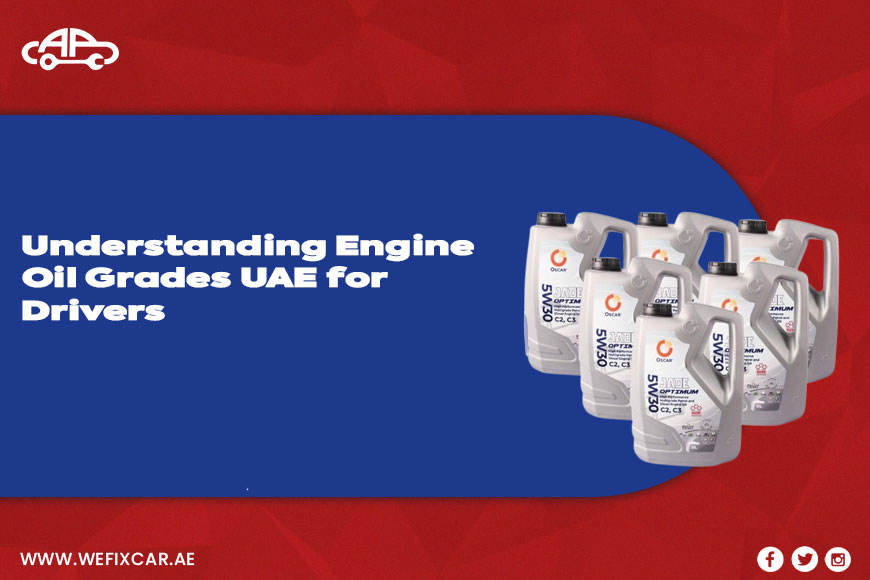Understanding Engine Oil Grades UAE for Drivers
In the UAE, when it comes to vehicle maintenance that is beyond routine is which engine oil you put in it plays a health role in your engine, fuel efficiency, and overall driving experience. In a state of constant heat and with many different driving conditions, it is of great importance for new and experienced drivers to know which oil grade is the right one for their car. Which engine oil grades UAE you go for as a car owner plays a large role in how well your engine is protected, the quality of the lubrication, and in the long term, how well your car performs.
Engine oil grades UAE are a measure of the oil’s viscosity levels, its flow at varying temperatures. These grades, which are put forth by the Society of Automotive Engineers (SAE), present very important info on how the oil performs in cold and hot conditions. In the UAE, we face a unique engine challenge, which is best met by the use of oil grades that have proven performance in high temperatures.
Read More: Car Suspension Replacement UAE – Signs, Symptoms & Solutions
Why Engine Oil Grades UAE Matter?
In the UAE’s very hot climate, engine temps run higher for longer, which in turn puts your engine oil to the test it has to perform at high levels without breaking down or losing protection. We see that which engine oil grades UAE residents put their trust in do a great job in reducing wear and tear, in keeping internal parts clean, and in improving overall engine performance.
Lower in quality or which are incorrect oil grades cause your engine to overheat or wear out prematurely. Also, premium oil, which has the right viscosity levels, does indeed provide proper lubrication in peak summer conditions. Viscosity, which is a term often used interchangeably with thickness, is a measure of how well the oil flows at given temperatures. For UAE conditions, it is recommended that you use oils that maintain their structure at high heat.
5W30 vs 10W40 – Which is Better for UAE Roads?
In the UAE, 5W30 and 10W40 are the types of oil that are the topics of most discussion. These numbers, which are present, indicate the viscosity of the oil at different temperatures. “W” is for winter, which stands for the oil’s performance at low temperatures; the number following the W indicates performance at higher temperatures.
5W30 at low temperatures is a thinner oil, which in turn provides better fuel efficiency. It flows better at cold starts and is put to use in more moderate climates, which also includes new cars with close tolerances. But in the UAE’s hot climate, 5W30 may not give the same protection as heavier oils, which see action in very hard use.
On the other hand, we see 10W40, which at higher temperatures has a greater thickness and also puts up better temperature resistance and wear protection. It is better for older engines, trucks that tow or carry heavy loads, and those that operate in high heat, like the UAE. The difference between 5W30 vs 10W40 may present itself in how your engine performs in daily traffic, on the highway, or in the desert.
Lubrication Quality and Oil Performance in UAE Driving Conditions
Engine oil’s main function is to reduce friction between moving parts. This is where lubrication quality steps in as a critical issue. In the UAE, we see temperatures go above 45°C, at which point the oil’s viscosity must not break down, and it has to protect engine components from wear. Also, if an oil does not have good thermal stability, it may thin out too much, which in turn causes metal-to-metal contact that, in turn, may severely damage the engine.
High-quality oils that are made for performance maintain their lube quality through a range of temperatures. What you see is what you get with the oils’ make-up and which suits your engine\’s needs best, that is, when you visit the best results. Which in turn means a smoother driving experience, fewer repair issues, and an extended engine life.
Choosing the right oil as per your vehicle manufacturer’s recommendation is key, but so is what that oil does in severe weather. In summer, which is a particular issue for drivers in the UAE, we advise on synthetic or semi-synthetic oils for best protection.
How Often Should You Change Engine Oil in the UAE?
In the UAE, the frequency of oil changes is higher due to dust, heat, and high-speed driving. While many cars recommend oil changes every 10,000 km or 6 months, which may be the case in other parts of the world, in the UAE, we see that it is best to change your oil every 5,000 to 8,000 km for the best engine health. Always check your car’s manual and also pay attention to the state of your oil.
We at We Fix Car recommend that all drivers get themselves informed on engine oil grades UAE, which we see in our country, and also to research the practical differences between 5W30 and 10W40, and by all means choose an oil that best fits the climate and your specific driving conditions. Also, we put in that a little investment in the right oil will protect your engine’s health and see to it that your car runs very efficiently through the rough weather.
Frequently Asked Questions (FAQs)
1. Which is the best engine oil for the UAE weather?
For hot weather, 10W40 is the preferred choice, which also does a better job at high-temperature protection.
2. Is it ok to use 5W30 oil in my car in the UAE?
Yes, of course, if your car manufacturer says so, also 10W40 does a better job in extreme temps.
3. Which oil weight is right for my car?
Always follow the manual’s instructions, also take into account the UAE’s climate when choosing viscosity.
4. What is the frequency of engine oil change in the UAE?
Every 5,000 to 8,000 km, which is also around every 6 months, we do it—also based on your driving conditions and environment.
Let us at We Fix Car we’ll help you out with the right oil choice and see to it that your engine performs at its best. Your car is worth nothing but the best care after all.



